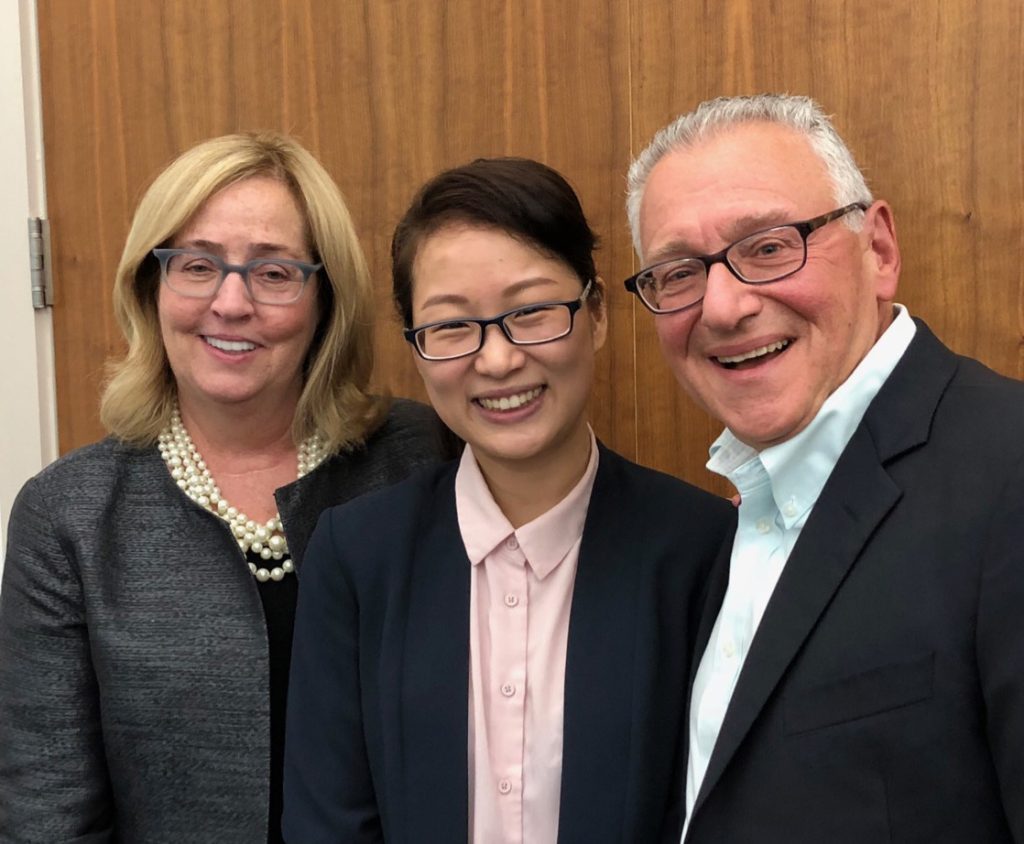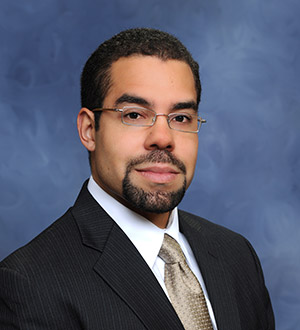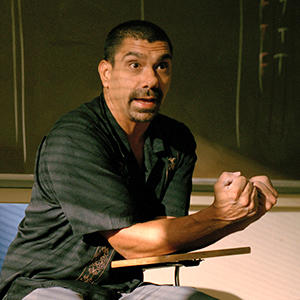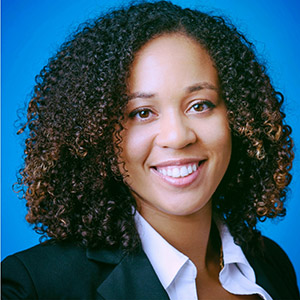“Both of them loved Fordham,” said their son, William J. Toppeta, FCRH ’70, a University trustee who with his wife, Debra Toppeta, created the scholarship in 2000 to honor them and benefit Fordham students—just one of their many generous gifts to the University.
The scholarship has turned out to be a richly rewarding way to honor his parents’ legacy.
For years, it helped bring a Fordham education within financial reach for several students at a time. Then, five years ago, the Toppetas modified the scholarship to cover full tuition as well as living expenses for one student facing high financial hurdles, in the process forming a bond with the students—two, so far—who have received this full support.
In 2020, seeking to advance the cause of racial justice, the Toppetas once again modified the scholarship so that it’s awarded with a preference for students who, in addition to showing academic merit and financial need, are first-generation college students or come from underrepresented racial and ethnic groups. The murder of George Floyd “had a huge impact on us,” William Toppeta said. “We wanted to actually do something that was impactful as an anti-racist example in action.”
They are also making a new contribution to their scholarship fund, advancing two priorities of the University’s $350 million fundraising campaign, Cura Personalis | For Every Fordham Student: access and affordability, as well as diversity, equity, and inclusion.
A Personal Bond
The current Toppeta Scholar, Gianna McGrath, a sophomore in the Gabelli School of Business, got the news in her second week at Fordham and was immediately moved to tears of joy. “It’s kind of an indescribable feeling, an eternal gratefulness,” she said.
The scholarship allayed her and her family’s worries about her loan amounts and allowed her to cut back on part-time work in favor of other things, like exploring the city and joining student clubs. She soon learned that the Toppetas were personally interested in her success. After meeting them at dinner with her family, she found they were “very genuine and down to earth,” said McGrath, who was born in Jamaica. “They’re so loving of all cultures, all people.”

The first recipient of the full scholarship, Huiling Cai, GABELLI ’21, immigrated from China seven years ago and earned an associate degree from LaGuardia Community College in New York City, learning English along the way. Receiving the Toppeta scholarship made possible her Fordham education and everything that has flowed from it, including her former job at EY and her current job at PwC, she said.
And the Toppetas became a welcome presence in her life in many ways, such as visiting her during her first month at Fordham; attending a ceremony for her and other Dean’s List honorees; and providing advice and support during challenging moments. “They are truly my angels,” she said.
The benefits go both ways. “It’s not just Gianna and Huiling who’ve benefitted from this. We’ve gotten a lot back,” Debra Toppeta said. “It’s just enriched our lives tremendously.”
In an interview, they elaborated on their reasons for modifying the scholarship, as well as lessons learned over the course of their careers—he, as an executive at MetLife and president of management consulting firm Macomber Peak Partners; she, as an attorney and founder and publisher of the award-winning website Woman Around Town.
Can you tell me more about your decision to refocus the John and Rita Toppeta Endowed Scholarship on students from underrepresented groups?
William Toppeta: My father felt very strongly about Jesuit education. He thought that the training that he got at Fordham was strongly morally based. And I think that again sort of connects to what we’re trying to do here with the scholarship. We believe very strongly that this is the right thing to do. Racism is still part of this country, but it’s been part of this country for hundreds of years, and each of us needs to do something about it.
What we’re doing, we think, is 100% consistent with Fordham’s history and philosophy. Fordham has always been a place that was focused on the underdog, the people who did not have the advantages. What Bishop John Hughes had in mind when he founded Fordham is that he wanted to give opportunity for people to get a higher education who otherwise would not have had that opportunity. At the time, most of those people happened to be Irish, and he, of course, was Irish. Then later on it was others—it was people from Eastern and Southern Europe. My father was one of those people.
Your mother knew something about facing discrimination too, I think?
William: She did talk about it. Her father was a lawyer, and she and my father practiced with him in New York City for a time. She said to me that when her father first sent her to court, she answered the calendar call for her client and the clerk of the court said to her, “No, no, no, you have to be a lawyer to answer the calendar call.” And she said, “I am a lawyer.” So she faced a lot of obstacles, but I think it made her tougher.
What career advice would you offer students?
William: When I was at Fordham, we learned a lot about the Ignatian and the Jesuit perspective, and one of its fundamentals is that a person should have a contemplative life and an active life. I think part of the contemplative part of life is to think about getting to know yourself and understanding yourself, and your abilities and qualities, in as objective a way as you can. Somewhere along the line, either someone else is going to ask you or you’re going to ask yourself, can I accomplish that? When you’re offered a job or an opportunity, you’d better know the answer, because you may not be given much time to decide. I’ve had situations in my career where I was given 24 hours to decide whether I was leaving the country or not for an opportunity. I think in our times, things happen very, very fast, and so if you don’t take time to think quietly about things, you’re going to miss a lot of chances. A lot of life comes down to fundamental principles and understanding, and I think Fordham is very strong on these.
Debra Toppeta: My advice would be to always continue to grow. The way to really get to know yourself is to just keep pushing forward and trying new things. Stay flexible, keep informed, and keep never stop learning so you’re always prepared for your next opportunity, because they’ll present themselves in ways you didn’t expect. I started in business, and then I went to law school, and then I started Woman Around Town. My partner, Charlene Giannetti, came up with the idea; she was a journalist at Businessweek and wanted to branch out on her own, and she knew I could write, and that I was a lawyer and was looking for my next endeavor.
So I jumped at it, and it’s been terrific. It was very challenging when we started, but we also had great opportunities because it was during the Great Recession, when print media was laying off reporters, and we were able to offer them work. We’ve received over 30 awards for journalism from various organizations.
Is there a book that has had a lasting influence on you?
William: I would point to categories of books. I read a lot of history and biography because they’re the story of challenges that people faced, when they succeeded, when they failed. I don’t necessarily think that history repeats itself, but we can certainly learn from history and see parallels. I just finished reading a very good history by Simon Sebag Montefiore of the history of the Romanovs, the family that ruled Russia for 300 years. And if you read that history, and then you think about what’s going on today with Russian president Vladimir Putin and Ukraine, you can see very clearly that Putin is just a continuation of the czars in a slightly different form.
Debra: I read The Warmth of Other Suns, by Isabel Wilkerson, about the Great Migration of African Americans from the South to the North and West. It’s a collection of stories that shows you just what people will do to improve their lives and their family’s lives. Each one of those stories is like a profile in courage and very inspirational.
Looking at the world today, what are you optimistic about?
William: I’m optimistic about a couple of things. One, people are still free to think and say what they want within very broad parameters in this country. So it makes me optimistic that at least at the moment, we are still operating democratically. The other thing I’m optimistic about is the young people. The more young people that I meet, the more confident I am about the future. I really do think that the younger generation is better equipped than we were, and that they’re genuinely trying, in most cases, to do the right thing.
To inquire about supporting scholarships and financial aid or another area of the University, please contact Michael Boyd, senior associate vice president for development and university relations, at 212-636-6525 or [email protected]. Learn more about Cura Personalis | For Every Fordham Student, a campaign to reinvest in every aspect of the Fordham student experience.
]]>Then, in sophomore year, one of his professors—Mark Naison, Ph.D.—learned of his worries and called a Fordham administrator in search of funding help. And that’s how Purnell became one of the scores of students who benefit every year from the UPS Endowed Fund, Fordham’s largest donor-supported scholarship fund and one of the oldest scholarship funds at the University.
Money was a real concern for Purnell and his family; his father was a New York City transit worker and his mother worked as a secretary at St. Patrick’s Cathedral. The UPS funding award not only eased their financial worries but also gave Purnell new confidence to apply for external funding for his undergraduate and, later, his graduate studies.
“It just really motivated me,” said Purnell, a 2000 graduate of Fordham College at Rose Hill.

“I can remember just feeling very supported by the school, very encouraged to continue to pursue academics, and to do the best that I could in the majors that I had begun to gravitate towards.
“It was an indication that the studies that I was doing in the humanities were valued,” Purnell said. He later earned a doctorate in history at New York University, taught at Fordham, and worked as co-research director on Fordham’s Bronx African American History Project. Today he is the Geoffrey Canada Associate Professor of Africana Studies and History at Bowdoin College.
Purnell is one of hundreds of students for whom the UPS Endowed Fund has made a pivotal difference since it was established five decades ago. Without it, many would not have been able to attend Fordham at all.
Origins of an Endowment
The endowment emerged out of relationships among UPS officials and Leo P. McLaughlin, S.J., president of Fordham from 1965 to 1969, said Arthur McEwen, FCRH ’55, a retired vice president of human resources at UPS.
Father McLaughlin had gone to grammar school and high school with Walter Hooke, a civil rights and labor activist who was vice president of personnel at UPS, said McEwen, who reported to Hooke at the time. The company president, James McLaughlin, had gone to a Jesuit high school in Chicago, and his son was a Jesuit scholastic teaching at Fordham Prep, McEwen said.
Father McLaughlin invited the two UPS officials to dinner, where the talk turned to the undergraduate college that would soon open at Fordham’s new Lincoln Center campus, and how the University could foster more racial diversity among its students.
When the college opened in 1968, the first entering class included 55 minority students who benefited from a new scholarship funded by UPS’s philanthropic arm, the 1907 Foundation (later renamed the UPS Foundation), McEwen said.
Supplemented with further gifts from the foundation, the UPS Endowed Fund has grown to $18 million and currently supports 154 students at both the Rose Hill and Lincoln Center campuses.
In decades past, the fund has had other uses: It helped teachers in the South Bronx attend Fordham’s Graduate School of Education, for instance. It also supported an internship program for Graduate School of Social Service students at the South Bronx’s Highbridge Community Life Center.
Creating Opportunity for Students

Today, the fund provides the UPS Scholarship to a diversity of students who would not otherwise have been able to attend Fordham. And it often provides financial flexibility that transforms students’ experiences at the University; past scholarship recipient José Haro, FCRH ’00, was able to study in Mexico for a year, and also did well academically “because I actually had time to study” rather than work for money, he said. He estimated that the scholarship from UPS covered about 20 percent of his costs.
When he got to graduate school, he felt well prepared. “I can’t put a value on the education I got from Fordham,” said Haro, an assistant professor of philosophy at the Borough of Manhattan Community College. He earned master’s degrees at New York University and at the University of South Florida, where he also earned his doctorate.
For Adrienne Boykin, GABELLI ’09, the scholarship funding from UPS came at a critical moment in sophomore year. A first-generation college student, she had transferred to Fordham from a community college, drawn by the top-flight accounting program and the Jesuit education. But finances were always a big concern, and she was having doubts that she could afford to stay.
“I thought all the pieces were falling apart,” she said. “But when I was able to get this scholarship, I just felt such a sense of relief and joy.”

Upon graduating, she went to work for accounting giant PwC, or PricewaterhouseCoopers, having taken advantage of its recruitment relationship with Fordham. “It was a very good job coming out of college,” she said. “Being at another school, I’m not sure that I would have been able to have that specific access” to employment opportunities at the firm, said Boykin, who is now the director of finance and administration at America Needs You, a nonprofit that provides mentoring and career development support to first-generation college students.
Many current recipients describe the scholarship as an important piece in the financial aid puzzle that brought a Fordham education within view. Mia Kroeger, a sophomore from Roswell, Georgia, was considering many colleges until she visited the Rose Hill campus. She was awestruck, “and when I met the people, I realized this was the perfect place for me,” she said.
The UPS Scholarship brought Fordham within the realm of possibility. “It was a big relief,” she said. Being able to choose Fordham “was really, really exciting.”
]]>